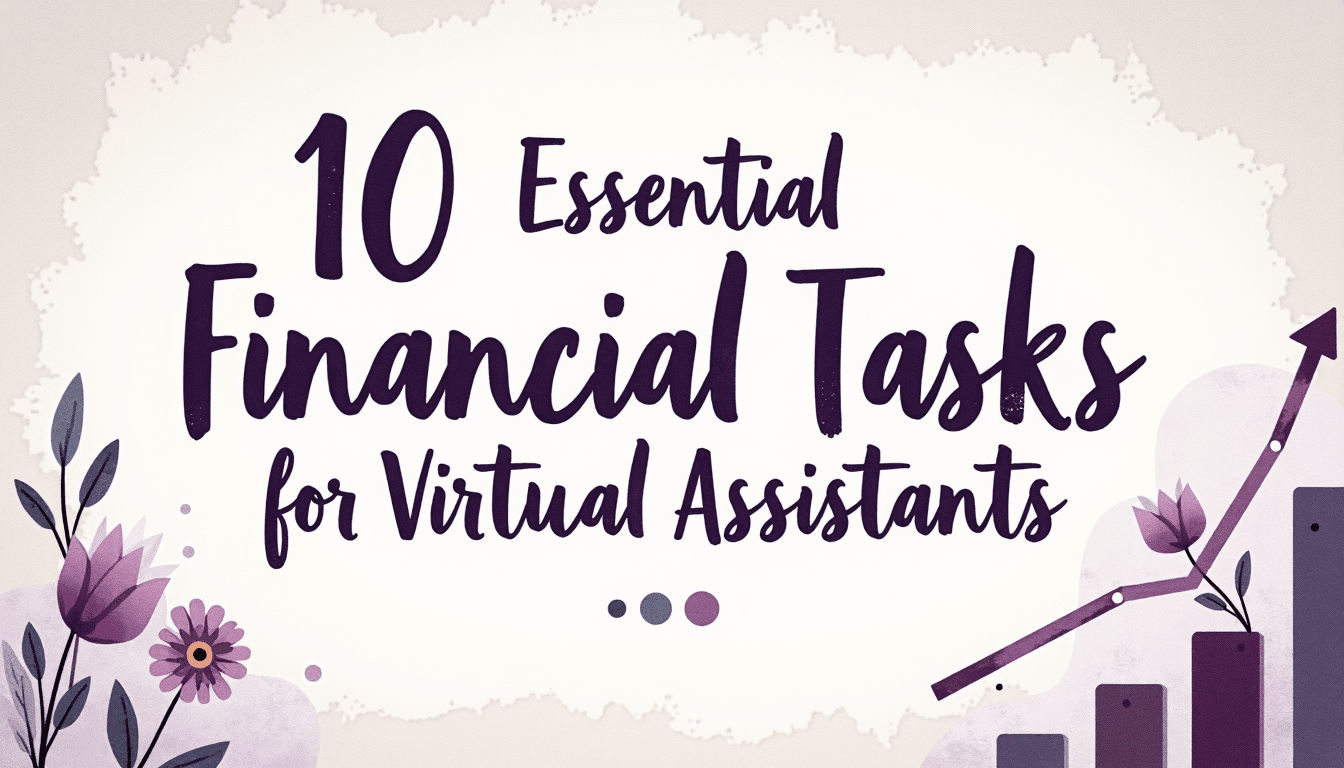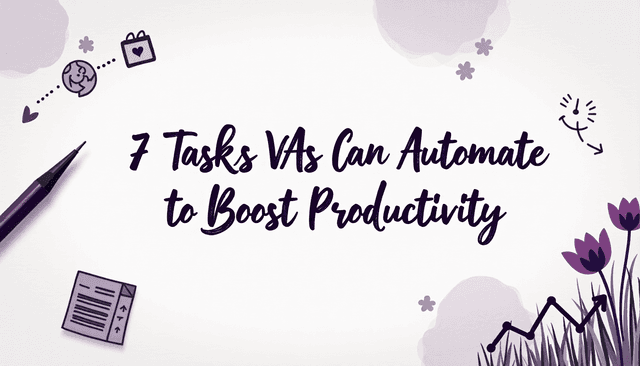10 Essential Financial Tasks for Virtual Assistants
September 19, 2024 • 13 min read
Master pre-administrative financial tasks to boost your value as a VA. Learn document management, data entry, invoicing, and more to become indispensable to clients.

As a virtual assistant, mastering pre-administrative financial tasks is crucial for your success and your clients' satisfaction. These skills can set you apart in a competitive market and help you provide more value to small business owners and entrepreneurs.
Here's why these tasks matter:
- Time-saving: By handling these tasks efficiently, you free up your clients to focus on growing their business.
- Error reduction: Proper financial management reduces costly mistakes.
- Better decision-making: Organized finances lead to clearer insights for your clients.
Let's look at an example:
Sarah, a VA for a small marketing agency, implemented a new digital filing system. This simple change cut her client's bookkeeping time by 30% and helped catch a $500 billing error.
By mastering these tasks, you'll become an indispensable part of your clients' businesses. You'll help them:
- Stay organized
- Meet deadlines
- Maintain accurate records
- Make informed financial decisions
Ready to boost your skills and your clients' bottom lines? Let's dive into the 10 essential tasks you need to know.
Virtual assistants can enhance their value by mastering 10 essential pre-administrative financial tasks. These include document organization, data entry, invoice processing, expense categorization, bank reconciliation, client billing, financial reporting, compliance, accounts payable management, and financial software navigation. Mastering these skills can lead to higher-paying clients and more diverse projects.
Introduction
As a virtual assistant (VA), you're the backbone of many businesses. But did you know that mastering pre-administrative financial tasks can skyrocket your value and grow your business? Let's dive in!
Imagine this: You're juggling client calls, managing schedules, and suddenly, your top client asks you to help with their finances. Panic sets in. Sound familiar?

Don't worry! By mastering key financial tasks, you'll:
- Stand out from the crowd
- Charge premium rates
- Attract high-paying clients
- Reduce stress and boost confidence
Here's what Sarah, a successful VA, shared:
"Learning basic financial tasks doubled my income in just six months. Clients see me as indispensable now!"
But it's not just about the money. These skills make you a true partner in your clients' success. You'll spot trends, flag issues early, and help make informed decisions.
Ready to level up your VA game? Let's explore the 10 essential pre-administrative financial tasks every savvy VA should master. Your future self will thank you!
1. Document Sorting and Organization
As a virtual assistant or small business owner, mastering document management is crucial. It's the foundation for smooth operations and financial clarity.
Digital file management
Embrace cloud storage solutions like Google Drive or Dropbox. They offer easy access and automatic backups. Create a system where you can find any document in under 30 seconds.

Creating a consistent naming convention
Develop a clear, logical naming system. For example:
YYYYMMDD_ClientName_DocumentType20230615_AcmeCorp_Invoice
This approach makes sorting and searching a breeze.
Implementing a folder structure
Design a hierarchy that mirrors your business processes:
├── Clients
│ ├── ClientA
│ │ ├── Invoices
│ │ ├── Contracts
│ │ └── Correspondence
│ └── ClientB
├── Finances
│ ├── Bank Statements
│ ├── Tax Documents
│ └── Expense Reports
└── Admin
├── HR
└── Policies
Remember, a well-organized system saves time and reduces stress. It's an investment in your business's efficiency and professionalism.
2. Basic Data Entry
Data entry is the backbone of financial management for virtual assistants and small business owners. It's crucial to get it right from the start.
Importance of accuracy in financial data entry
Accurate data entry:
- Prevents costly errors
- Ensures reliable financial reports
- Builds trust with clients
"Garbage in, garbage out. Accurate data entry is the foundation of sound financial management." - Jane Doe, Certified Bookkeeper
Common data entry tasks for VAs
- Recording income and expenses
- Updating client information
- Logging billable hours
- Entering invoice details
Tools and techniques for efficient data entry
- Use accounting software like QuickBooks or FreshBooks
- Set up data validation rules to catch errors
- Create templates for recurring entries
- Schedule regular data backups
💡 Pro Tip: Batch similar tasks together to boost efficiency. For example, dedicate an hour each day to entering all new invoices.
Remember, attention to detail is key. Double-check your work and don't rush. Your clients rely on your accuracy to make important business decisions.

3. Invoice Processing
Invoice processing is a crucial skill for virtual assistants, especially those working with small businesses and entrepreneurs. Mastering this task can save your clients time and money while ensuring smooth financial operations.
Organizing incoming invoices
Create a system to sort and file incoming invoices. Use digital tools like cloud storage or accounting software to keep everything in one place. For example, you might set up folders for each month or client, making it easy to find specific invoices later.
Verifying invoice details
Always double-check the following:
- Correct company name and address
- Accurate invoice number and date
- Itemized list of goods or services
- Correct pricing and calculations
- Proper tax rates applied
Preparing invoices for payment
Once verified, prepare invoices for payment:
- Enter the invoice into the accounting system
- Match the invoice to any purchase orders
- Get approval from the appropriate person
- Schedule the payment based on terms (e.g., net 30)
By mastering these steps, you'll become an invaluable asset to your clients, helping them maintain organized finances and smooth cash flow.
4. Expense Categorization
Expense categorization is a crucial skill for virtual assistants and small business owners. It's the foundation of accurate financial reporting and budgeting.
Setting up expense categories
Start by creating clear, logical categories that reflect your business's spending patterns. For example:
- Office Supplies
- Marketing
- Travel
- Software Subscriptions
Tip: Review your expenses from the past few months to identify common spending areas.

Properly allocating expenses
Consistency is key when allocating expenses. Here's a simple process:
- Review the expense details
- Identify the purpose of the expense
- Assign it to the appropriate category
- Double-check for accuracy
Remember: When in doubt, ask for clarification from the business owner or accountant.
Handling receipts and documentation
Proper documentation is crucial for tax purposes and financial clarity. Try this system:
- Scan receipts immediately using a smartphone app
- Name files consistently (e.g., Date_Vendor_Amount.pdf)
- Store digital copies in a cloud-based folder, organized by month
By mastering expense categorization, you'll provide invaluable support to your clients or your own business, ensuring financial clarity and compliance.
5. Bank Statement Reconciliation
Bank statement reconciliation is a crucial task for virtual assistants and small business owners. It's the process of matching your financial records with your bank statements to ensure accuracy and catch any discrepancies.
Why It Matters
Reconciling bank statements:
- Catches errors early
- Prevents fraud
- Helps track cash flow
- Ensures accurate financial reporting
Simple Steps to Reconcile
- Gather your bank statement and financial records
- Compare transactions line by line
- Mark off matching transactions
- Investigate any differences
- Adjust your records if needed
Handling Discrepancies
Found a mismatch? Don't panic! Common causes include:
- Timing differences (checks not yet cashed)
- Forgotten expenses
- Bank fees
Pro Tip: Use accounting software to streamline this process. Many tools offer automatic matching features, saving you time and reducing errors.
Remember, regular reconciliation (at least monthly) keeps your finances in check and your business running smoothly. It's a small investment of time that pays off in financial clarity and peace of mind.

6. Client Billing Preparation
As a virtual assistant or small business owner, mastering client billing is crucial for maintaining a healthy cash flow. Let's break down this essential task into manageable steps.
Tracking billable hours and expenses
Keep a detailed record of your work:
- Use time-tracking tools like Toggl or RescueTime
- Log expenses as they occur
- Categorize tasks for easy reporting
Pro tip: Set up automatic time tracking to capture all billable moments accurately.
Creating professional invoices
Your invoice is often the last touchpoint with a client, so make it count:
- Use accounting software like QuickBooks or FreshBooks
- Include your logo and brand colors
- Clearly list services, hours, and rates
- Add payment terms and methods
Setting up recurring billing
For ongoing clients, automate your billing process:
- Discuss recurring billing with your client
- Set up a recurring invoice in your accounting software
- Choose a billing cycle (weekly, monthly, quarterly)
- Review and adjust as needed
By mastering these billing tasks, you'll ensure steady income and project a professional image to your clients.
7. Basic Financial Reporting
As a virtual assistant, understanding financial reports is key to supporting your clients effectively. Let's break down the essentials:
Types of reports VAs should know
- Profit and Loss Statement
- Balance Sheet
- Cash Flow Statement
These reports form the backbone of financial analysis for small businesses and entrepreneurs.
Generating simple financial reports
Most accounting software like QuickBooks or Xero can generate these reports with a few clicks. Your job is to:
- Ensure all transactions are up-to-date
- Select the correct date range
- Double-check for any obvious errors
Interpreting basic financial data
Here's a quick guide:
- Profit and Loss: Shows if the business is making money
- Balance Sheet: Reveals the company's financial health at a glance
- Cash Flow: Indicates how well the business manages its cash
Pro Tip: Always compare current reports with previous periods to spot trends.
By mastering these basics, you'll provide invaluable support to your clients, helping them make informed decisions and grow their businesses.
8. Document Retention and Compliance
As a virtual assistant or small business owner, managing documents is crucial. Let's break down this important task:
Understanding retention requirements
Different documents have different retention periods. For example:
- Tax records: Keep for at least 7 years
- Employee records: Retain for 3 years after termination
- Financial statements: Store permanently

Implementing a document retention policy
- Create a clear policy outlining what to keep and for how long
- Use a digital filing system for easy retrieval
- Set up automatic reminders for document disposal dates
Ensuring data security and confidentiality
Protect sensitive information:
- Use strong passwords and two-factor authentication
- Encrypt important files
- Regularly back up data to a secure cloud service
"A well-organized document retention system is like a safety net for your business." - Jane Doe, Business Consultant
Remember, proper document management isn't just about organization—it's about protecting your business and clients. Stay compliant, stay secure, and save time in the long run.
9. Accounts Payable Management
Managing accounts payable is crucial for maintaining healthy cash flow and vendor relationships. As a virtual assistant, mastering this skill can significantly boost your value to clients.
Tracking due dates for payments
Create a simple spreadsheet or use accounting software to track invoice due dates. Set up a system that allows you to:
- List all vendors
- Record invoice amounts and due dates
- Prioritize payments based on urgency
Setting up payment reminders
Avoid late fees and maintain good vendor relationships by setting up timely reminders:
- Use calendar apps or project management tools to set alerts
- Schedule reminders a few days before each due date
- Consider automated email reminders for your clients
Preparing payment batches
Streamline the payment process by batching similar payments:
- Group payments by date or vendor
- Verify invoice details before processing
- Prepare necessary documentation for your client's approval
By mastering these accounts payable tasks, you'll help your clients maintain strong financial health and save time for more strategic activities.
10. Financial Software Navigation
Mastering financial software is crucial for virtual assistants and small business owners. Let's dive into the essentials:
Overview of common accounting software
Popular tools include QuickBooks, Xero, and FreshBooks. Each offers unique features, but they all aim to simplify financial management.
Basic functions VAs should master
- Data entry: Accurately record income and expenses
- Invoicing: Create and send professional invoices
- Reporting: Generate basic financial reports
- Bank reconciliation: Match transactions with bank statements
Tips for efficient software use
- Use keyboard shortcuts to speed up data entry
- Set up recurring transactions for regular bills or income
- Utilize built-in templates for reports and invoices
- Enable cloud sync for real-time collaboration with clients
"The right financial software can turn hours of work into minutes," says Sarah, a VA specializing in bookkeeping.
By mastering these tools, you'll boost your value as a VA and help your clients maintain healthy finances. Remember, practice makes perfect – don't be afraid to explore and learn!
Conclusion
Mastering pre-administrative financial tasks is a game-changer for virtual assistants and small business owners. By honing these skills, you'll not only streamline your operations but also boost your value to clients.
Let's recap the essential tasks we've covered:
- Document sorting and organization
- Basic data entry
- Invoice processing
- Expense categorization
- Bank statement reconciliation
- Client billing preparation
- Basic financial reporting
- Document retention and compliance
- Accounts payable management
- Financial software navigation
These skills form the backbone of efficient financial management. For VAs, they open doors to higher-paying clients and more diverse projects. Small business owners can save time and money by handling these tasks in-house or delegating them confidently.
Automation is your secret weapon in this process. Tools like cloud-based accounting software can dramatically cut down on manual work. For example, using OCR technology for invoice processing can reduce data entry time by up to 80%.
Remember, mastering these tasks isn't just about crunching numbers. It's about providing insights that drive business growth. By understanding the financial pulse of a business, you become an indispensable asset to your clients or your own venture.
Take action today. Start by identifying which of these tasks you can improve on. Your future self (and your bank account) will thank you.

Frequently Asked Questions
How can mastering pre-administrative financial tasks benefit me as a virtual assistant?
Mastering pre-administrative financial tasks can significantly benefit you as a virtual assistant by setting you apart in a competitive market, allowing you to charge premium rates, attracting high-paying clients, and reducing stress while boosting confidence. These skills make you a valuable partner in your clients' success, enabling you to spot trends, flag issues early, and help make informed decisions.
What are some effective strategies for organizing digital files and documents?
Effective strategies for organizing digital files and documents include: 1) Using cloud storage solutions like Google Drive or Dropbox for easy access and automatic backups, 2) Creating a consistent naming convention (e.g., YYYYMMDD_ClientName_DocumentType), and 3) Implementing a logical folder structure that mirrors your business processes. These strategies help create a system where you can find any document in under 30 seconds, saving time and reducing stress.
How often should bank statement reconciliation be performed?
Bank statement reconciliation should be performed regularly, at least monthly. This frequency helps catch errors early, prevents fraud, helps track cash flow, and ensures accurate financial reporting. Regular reconciliation keeps your finances in check and your business running smoothly, providing financial clarity and peace of mind.
What are the key financial reports that virtual assistants should be familiar with?
Virtual assistants should be familiar with three key financial reports: 1) Profit and Loss Statement, which shows if the business is making money, 2) Balance Sheet, which reveals the company's financial health at a glance, and 3) Cash Flow Statement, which indicates how well the business manages its cash. Understanding these reports is essential for supporting clients effectively and helping them make informed business decisions.
How can I improve my efficiency in using financial software?
To improve efficiency in using financial software: 1) Learn and use keyboard shortcuts to speed up data entry, 2) Set up recurring transactions for regular bills or income, 3) Utilize built-in templates for reports and invoices, and 4) Enable cloud sync for real-time collaboration with clients. Regular practice and exploration of the software's features will also help you become more proficient over time.


